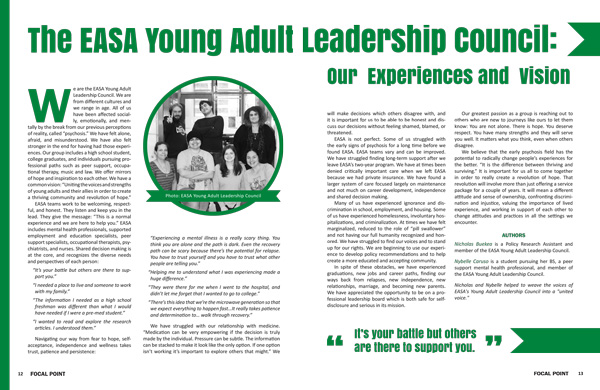
Abstract: Young adults with lived experience of psychosis explain their collective outlook and why they serve on EASA’s Young Adult Leadership Council.
"The EASA Young Adult Leadership Council: Our Experiences and Vision" (2016)
By Nicholas Buekea & Nybelle Caruso
We are the EASA Young Adult Leadership Council. We are from different cultures and we range in age. All of us have been affected socially, emotionally, and mentally by the break from our previous perceptions of reality, called "psychosis." We have felt alone, afraid, and misunderstood. We have also felt stronger in the end for having had those experiences. Our group includes a high school student, college graduates, and individuals pursuing professional paths such as peer support, occupational therapy, music, and law. We offer mirrors of hope and inspiration to each other. We have a common vision: "Uniting the voices and strengths of young adults and their allies in order to create a thriving community and revolution of hope."
EASA teams work to be welcoming, respectful, and honest. They listen and keep you in the lead. They give the message: "This is a normal experience and we are here to help you." EASA includes mental health professionals, supported employment and education specialists, peer support specialists, occupational therapists, psychiatrists, and nurses. Shared decision making is at the core, and recognizes the diverse needs and perspectives of each person:
"It's your battle but others are there to support you."
"I needed a place to live and someone to work with my family."
"The information I needed as a high school freshman was different than what I would have needed if I were a pre-med student."
"I wanted to read and explore the research articles. I understood them."
Navigating our way from fear to hope, self-acceptance, independence and wellness takes trust, patience, and persistence:
"Experiencing a mental illness is a really scary thing. You think you are alone and the path is dark. Even the recovery path can be scary because there's the potential for relapse. You have to trust yourself and you have to trust what other people are telling you."
"Helping me to understand what I was experiencing made a huge difference."
"They were there for me when I went to the hospital, and didn't let me forget that I wanted to go to college."
"There's this idea that we're the microwave generation so that we expect everything to happen fast...It really takes patience and determination to...walk through recovery."
We have struggled with our relationship with medicine. "Medication can be very empowering if the decision is truly made by the individual. Pressure can be subtle. The information can be stacked to make it look like the only option. If one option isn't working it's important to explore others that might." We will make decisions that others disagree with, and it is important for us to be able to be honest and discuss our decisions without feeling shamed, blamed, or threatened.
EASA is not perfect. Some of us struggled with the early signs of psychosis for a long time before we found EASA. EASA teams vary and can be improved. We have struggled finding long-term support after leaving EASA's two-year program. We have at times been denied critically important care when leaving EASA because we had private insurance. We have found a larger system of care focused largely on maintenance and not much on career development, independence, and shared decision making.
Many of us have experienced ignorance and discrimination in school, employment, and housing. Some of us have experienced homelessness, involuntary hospitalizations, and criminalization. At times we have felt marginalized, reduced to the role of "pill swallower" and not having our full humanity recognized and honored. We have struggled to find our voices and to stand up for our rights. We are beginning to use our experience to develop policy recommendations and to help create a more educated and accepting community.
In spite of these obstacles, we have experienced graduations, new jobs and career paths, finding our ways back from relapses, new independence, new relationships, marriage, and becoming new parents. We have appreciated the opportunity to be on a professional leadership board which is both safe for self-disclosure and serious in its mission.
Our greatest passion as a group is reaching out to others who are new to journeys like ours to let them know: You are not alone. There is hope. You deserve respect. You have many strengths and they will serve you well. It matters what you think, even when others disagree.
We believe that the early psychosis field has the potential to radically change people's experiences for the better. "It is the difference between thriving and surviving." It is important for us all to come together in order to really create a revolution of hope. That revolution will involve more than just offering a service package for a couple of years. It will mean a different attitude and sense of ownership, confronting discrimination and injustice, valuing the importance of lived experience, and working in support of each other to change attitudes and practices in all the settings we encounter.
Suggested Citation
Buekea, N., & Caruso, N. (2016). The EASA Young Adult Leadership Council: Our Experiences and Vision. Focal Point: Youth, Young Adults, and Mental Health, 30, 12-13. Portland, OR: Research and Training Center for Pathways to Positive Futures, Portland State University.